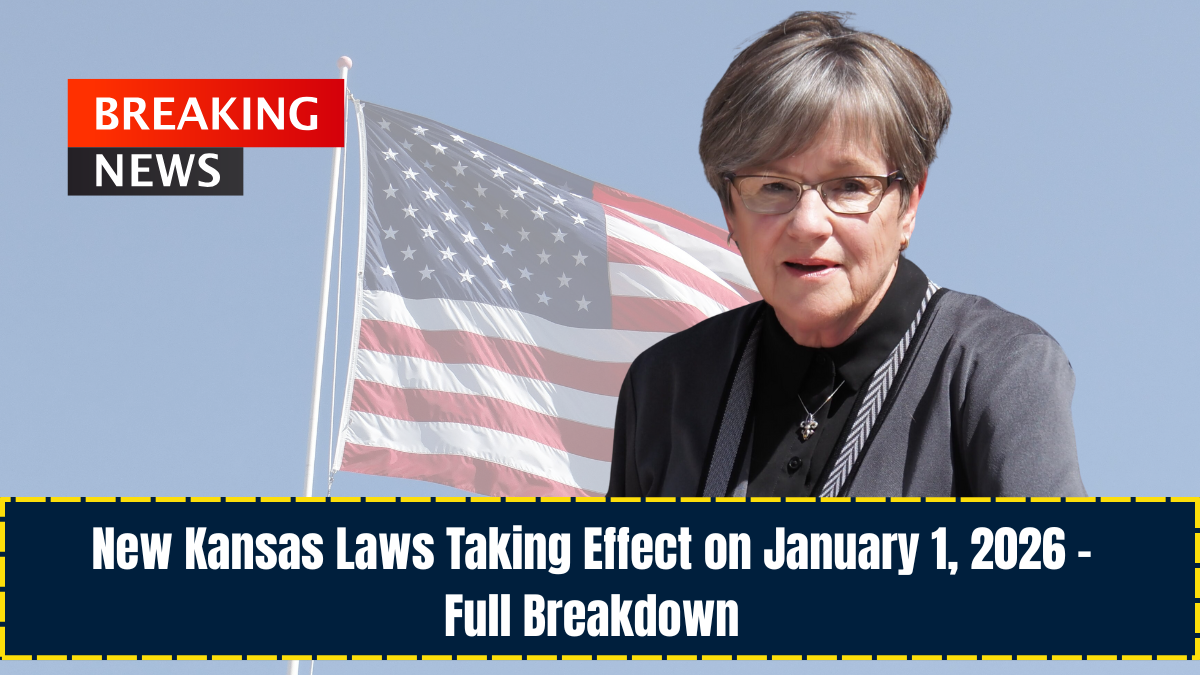Kansas lawmakers approved 129 new bills during the 2025 legislative session, with many taking effect in July 2025. However, 13 of these laws include provisions scheduled to officially begin on January 1, 2026.
Information from the Kansas Legislative Research Department (KLRD) highlights the bills and what changes residents can expect at the start of the new year.
Overview Of The Newly Effective Laws (Jan. 1, 2026)
House Bill 2110 – Amendments To The Kansas 911 Act
House Bill 2110 updates the Kansas 911 Act, including removing the requirement for the state 911 board to contract with a local collection point administrator.
While the bill was enacted immediately upon publication in the Kansas Register, changes concerning 911 fund distribution will activate on Jan. 1, 2026.
House Bill 2334 – Insurance Regulation Updates
HB 2334 revises multiple insurance-related laws, including the:
- Insurance Holding Company Act
- Uniform Agents Licensing Act
- Captive Insurance Act
It also creates the Protected Cell Captive Insurance Company Act.
Though passed in July 2025, premium tax rate and remittance provisions begin Jan. 1, 2026.
Senate Bill 4 – Deadline For Advance Voting Ballots
Effective July 2025, Senate Bill 4 requires all advance voting ballots to be returned by 7 p.m. on Election Day.
The enforcement of this rule officially begins Jan. 1, 2026.
Senate Bill 42 – Motor Vehicle Insurance Verification System
SB 42 updates the Kansas Insurance Code, including:
- Establishing a web-based system to verify motor vehicle liability insurance
- Updating the definition of “person” for enforcement purposes
Although enacted in July 2025, new provisions start Jan. 1, 2026.
House Bill 2122 – Higher Registration Fees For Electric Vehicles
This law increases registration fees for:
- Electric and hybrid passenger vehicles
- Electric motorcycles
- Trucks
Revenue will go to the state and local highway funds.
Fee changes take effect Jan. 1, 2026.
Substitute For House Bill 2152 – New Public Money Investment Rules
This bill:
- Establishes the public moneys pooled method
- Modifies rules around public deposits and investments
While active since July 2025, some provisions activate Jan. 1, 2026.
House Bill 2201 – New Kansas License Plates
HB 2201 authorizes three new Kansas license plates, with issuance beginning Jan. 1, 2026.
House Bill 2335 – Hunter Nation License Plate
This bill creates the Hunter Nation distinctive license plate, also available starting Jan. 1, 2026.
House Bill 2359 – Adult Guardianship and Conservatorship Laws
HB 2359 enacts:
- The Uniform Adult Guardianship and Protective Proceedings Jurisdiction Act
- The Kansas Uniform Guardianship, Conservatorship and Other Protective Arrangements Act
These provisions formally begin Jan. 1, 2026.
House Bill 2045 – Establishing the Kansas Office of Early Childhood
The law:
- Creates the Kansas Office of Early Childhood
- Revises childcare licensing rules, staff requirements, and related laws
Some provisions, including governor appointments, begin Jan. 1, 2026.
House Substitute For Senate Bill 9 – Military Site And Drone Restrictions
This act:
- Establishes the Kansas Land and Military Installation Protection Act
- Prohibits state purchase of drones with critical components sourced from a foreign principal or “country of concern”
Applicable enforcement sections go into effect on or before Jan. 1, 2026.
House Bill 2050 – Changes To The Kansas Department Of Insurance
Key updates include:
- Additional powers for the insurance commissioner
- Authority to set fines and fees
- Renaming the state regulator as the Kansas Department of Insurance
Some provisions begin Jan. 1, 2026.
Senate Substitute For House Bill 2007 – Statutory Reconciliation
This bill reconciles several amendments across Kansas statutes.
Although active since July 2025, remaining provisions activate Jan. 1, 2026.
Beginning January 1, 2026, Kansas will see substantial changes across multiple areas including insurance regulation, election procedures, vehicle registration, public financial policy, childcare governance, and license plate issuance.
These updates reflect a broader legislative effort to streamline administrative processes, modernize state systems, and refine public policy heading into the new year.




